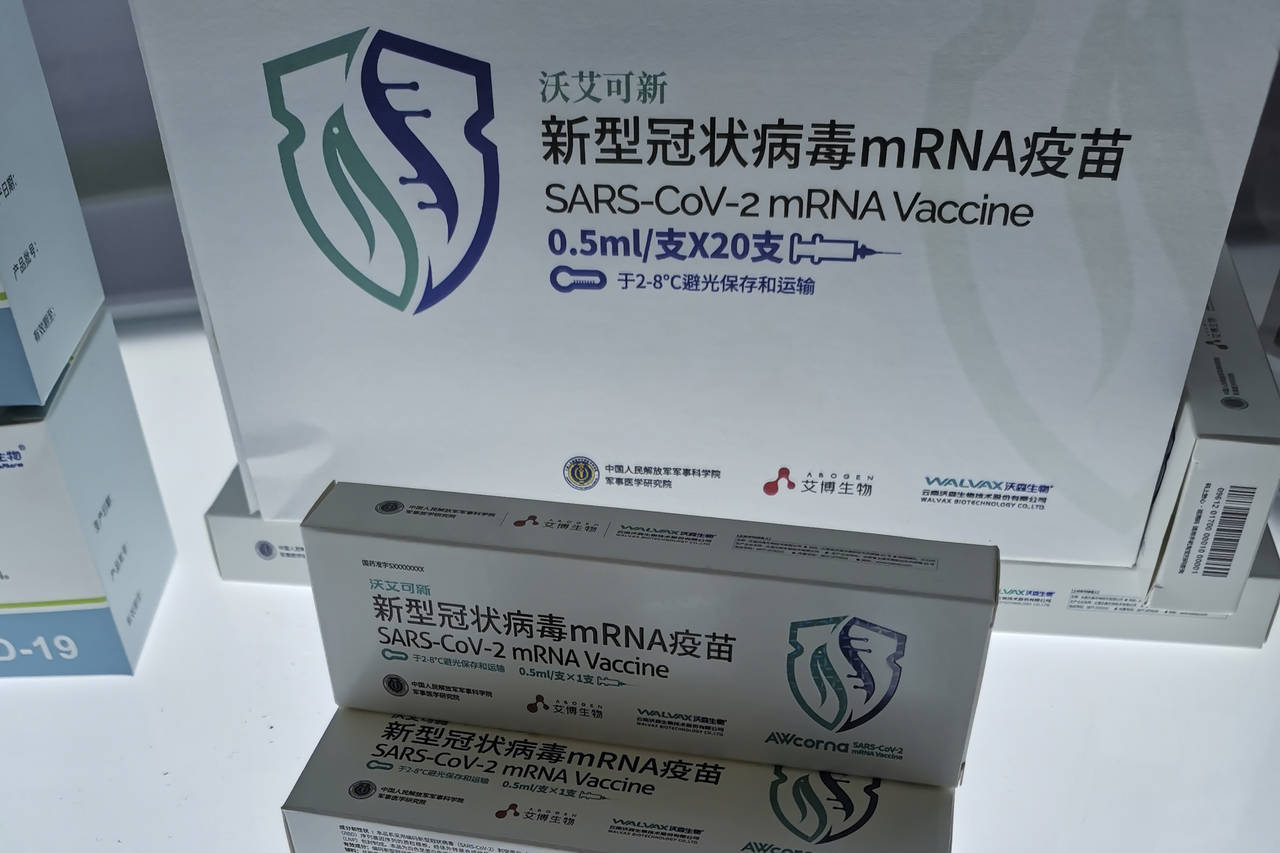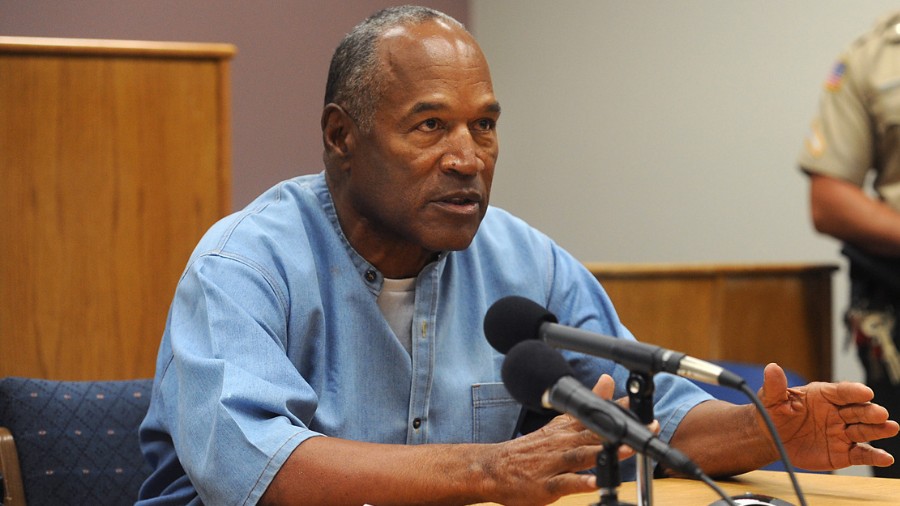China’s bet on homegrown mRNA vaccines holds back nation
May 23, 2022, 10:07 AM | Updated: May 24, 2022, 6:29 pm

China's first SARS-CoV-2 mRNA vaccine AWcorna, developed by Abogen Biosciences, Walvax Biotechnology, and the Academy of Military Medical Sciences' Institute of Biotechnology, is displayed at the National 13th Five-Year Scientific and Technological Innovation Achievement Exhibition in Beijing, China on Oct. 27, 2021. More than two years into the pandemic, China has not approved the more effective mRNA vaccines, instead choosing to pursue its own route on COVID-19 vaccines. (Chinatopix via AP)
(Chinatopix via AP)
TAIPEI, Taiwan (AP) — China is trying to navigate its biggest coronavirus outbreak without a tool it could have adopted many months ago, the kind of vaccines that have proven to offer the best protection against the worst outcomes from COVID-19.
As early as the spring of 2020 a Chinese pharmaceutical company, Fosun Pharma, reached an agreement to distribute — and eventually manufacture — the mRNA vaccine made by Pfizer and BioNTech. It still has not been cleared in mainland China, despite being authorized for use by separate authorities in Hong Kong and Macao.
Now health experts say that delay — a result of putting politics and national pride above public health — could lead to avoidable coronavirus deaths and deeper economic losses because whole cities would be locked down to insulate the country’s unprotected population.
“The biggest issue is about the delay of the reopening,” said Xi Chen, a health economist at Yale University’s School of Public Health. “The consequences will be huge, the supply chain disruption, the disruption to all kinds of service sectors.”
Studies have consistently shown that vaccination with mRNA vaccines made by Pfizer-BioNTech and Moderna offer the best protection against hospitalization and death from COVID-19. Chinese vaccines made with older technology proved fairly effective against the original strain of the virus, but much less so against more recent variants.
As this evidence became clearer, even countries that initially used Chinese vaccines and some other less effective Western-made vaccines have turned to mRNA vaccines for booster shots and new vaccinations.
Not China. Regulators have not publicly said why they have not acted — the mRNA vaccines are authorized in much of the world and have proven safe and effective in hundreds of millions of people. But a Chinese health official and another person directly involved in the negotiations told The Associated Press that authorities have held back because they want to master the technology in China and not depend on foreign suppliers. Both spoke on condition of anonymity, given the sensitive nature of the issue.
For more than a year, the approach seemed defensible. The country was able to keep the virus at bay better than any other large nation with its strict “zero COVID” approach that isolates infected people and locks down communities when infections pop up.
But now, the highly transmissible omicron variant is testing that strategy, requiring ever wider and longer lockdowns that are taking a greater economic and human toll. While other countries are able to operate close to normal because their people are protected by vaccination or previous infection, China is left with only its lockdown strategy to avoid huge numbers of hospitalizations and deaths.
China may be changing its mind. The Communist Party-owned Global Times newspaper reported last month that Fosun Pharma is still working with health authorities on its approval and Shanghai authorities recently issued new policies that could allow the import of COVID-19 vaccines. Fosun, based in Shanghai, did not respond to questions about the announcement.
China’s National Health Commission directed questions to the country’s drug regulator, the National Medical Products Administration. That agency did not respond to a faxed request for comment.
In the meantime, hopes for a Chinese-developed mRNA vaccine center on Abogen Biosciences, a startup founded in 2019 by Bo Ying, an American-trained scientist who once worked for Moderna.
The company has partnered with more established companies in the country such as Walvax, a private company founded in 2001, and the Academy of Military Medical Sciences, the military’s medical research facility. Abogen has raised more than $1.7 billion since 2020.
The company’s vaccine candidate succeeded in eliciting an immune response in a small, preliminary test in humans designed to evaluate safety, according to a study published in the journal Lancet Microbe.
The results were “promising,” said Dr. Vineeta Bal, who studies immune systems at the Indian Institute of Science Education and Research in Pune, India, although she said that a direct comparison of the immune response the shot triggered with the Pfizer and Moderna vaccines would have helped scientists better evaluate its performance.
But large studies that are needed to show whether the shot works to prevent infections or symptoms have not been completed. Abogen did not respond to requests for an interview.
Even if the studies can be completed and the vaccine proves effective, manufacturing the millions of doses required will be a challenge, experts say. Abogen built a manufacturing facility in December 2020 with a projected capacity of up to 120 million doses a year.
Manufacturing that vaccine and ensuring quality at scale will be a difficult hurdle to clear because mRNA is still a new technology, said Scott Wheelwright, chief operating officer at BioInno Bioscience, a Chinese biopharmaceutical contract manufacturer who has held conversations with Abogen.
In the meantime, Chen, the Yale health policy expert, said the Chinese government should better protect its elderly population by both approving the Pfizer vaccine and encouraging booster shots.
Using a Chinese phrase that means “giving up completely,” Chen said the change from “zero COVID” does not have to be all or nothing. “It doesn’t have to be tang ping or sticking to zero COVID,” Chen said. “I don’t think there are only two solutions, and we can stick to a middle ground.”
___
Ghosal reported from New Delhi. Associated Press journalist Dake Kang in Beijing contributed to this report.
___
The Associated Press Health and Science Department receives support from the Howard Hughes Medical Institute’s Department of Science Education. The AP is solely responsible for all content.
Copyright © The Associated Press. All rights reserved. This material may not be published, broadcast, rewritten or redistributed.















